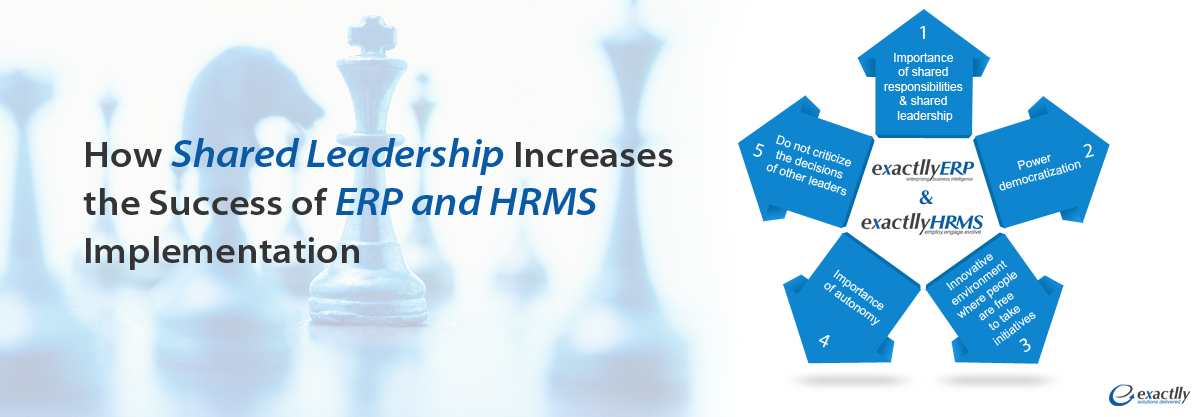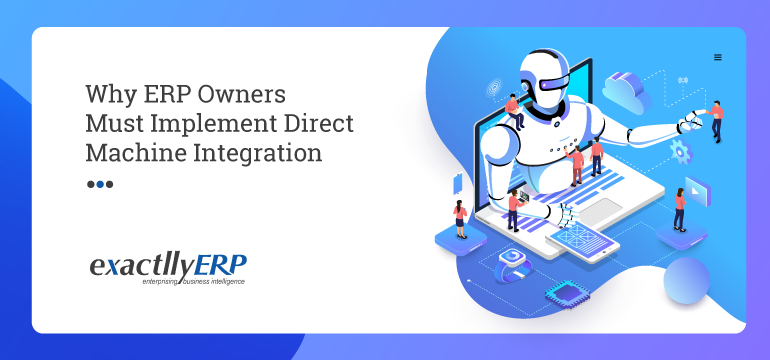How Shared Leadership Increases the Success of ERP and HRMS Implementation

Shared Leadership
A lot of times, we hear stories about how ERP and HRMS both can have high failure rates. One of the principle reasons why both of them fail is due to the ineptness of the leadership that undertakes implementation.
A single team leader who oversees the implementation has a higher risk of causing a failure than a group of team leaders who evaluate each others’ work and share the responsibilities. After all, shared responsibility is what drives us all towards success.
When it comes to HRMS and ERP implementation, it is important to be prepared for the changes that may occur. A single leader may not be able to predict that changes that may occur within a short period of time. And that frequently leads to failures during and after implementation of HRMS and ERP.
Sharing responsibilities or rather, shared leadership seems to be a crucial factor in the success of HRMS and ERP implementation. Shared leadership can be described as a process of democratizing leadership, entrusting even those at lower levels of hierarchy with responsibilities that they can take care of.
The idea is to entrust people with specific expertise with specific responsibilities so that all the members of the leadership team can work together to assess risks and formulate strategies effectively. Sharing leadership is not easy but it is not impossible either. There are a number of ways shared leadership can be employed at work. Here are some of the methods:
Make sure that you do not play the rules of hierarchy. Decentralize power and entrust leadership responsibilities with those who have the expertise. One must not hold on to power and must instead give decision making powers to those who are good at their expertise.
Define how much a person can make decisions: It is better to define the decision making abilities of each leader so that they do not cross their limits. While leadership needs to be shared, critical decision making must be defined so that they do not encroach upon others areas of functioning as well.
- Importance of shared responsibilities and shared leadership
Employees must be encouraged to take initiatives and work in an environment of innovation. When people are forthcoming with ideas, they must be encouraged to do so. Thwarting people from making decisions that are important leads to a lack of motivation among employees. If you installing a critical component like an ERP, the art of being forthcoming is very important.
- Power democratization
People like autonomy. Studies have proven that when people are given the kind of autonomy they need, they act as better leaders. While shared leadership is great, it does not mean all the leaders involved should not have autonomy. They must work autonomously but collaborate with certain aspects of ERP and HRMS implementation.
- Innovative environment where people are free to take initiatives
Shared leadership brings the prospect of arguments and disagreements. It is human nature not to agree with others and it is also human nature to build resentments. If an organization is implementing an HRMS or ERP, it is doubly important to avoid arguments for the sake of its success.
- Importance of autonomy
Shared leadership brings the prospect of arguments and disagreements. It is human nature not to agree with others and it is also human nature to build resentments. If an organization is implementing an HRMS or ERP, it is doubly important to avoid arguments for the sake of its success.
- Do not criticize the decisions of other leaders
Shared leadership and the implementation of HRMS and ERP
Increasingly, researchers are focusing on the importance of shared leadership when it comes to implementation of ERP and HRMS. They have argued that with a shared leadership module, there are higher chances of success and it also reduces the time that is required to carry out implementation. We found a study that looks at the importance of shared leadership in the implementation of ERP and HRMS.
The study, methodology and findings
Julia E. Hoch and James H. Dulebohn published a research paper in the Human Resource Management Review titled “Shared leadership in enterprise resource planning and human resource management system implementation”. Their paper describes the importance of shared leadership in the success rate of HRMS and ERP implementation.
They state that ERP and HRMS implementation have high rates of failure and that there are a number of factors involved in both the success and failure of HRMS and ERP adoption. The authors point at a lacuna in the area. There haven’t been many studies that explore the importance of shared leadership when it comes to implementation of ERP and HRMS in organizations. They argue that when there is shared leadership, it is easier to form a team of leaders who will be able to better engage in leadership behaviors.
Analyzing their study
When a single team leader is entrusted with the responsibility of overseeing ERP and HRMS implementation, a lot can go wrong because of human errors. The authors rue the fact that though shared leadership itself has received a lot of attention from the academia, it has not been studied alongside the implementation of ERP and HRMS.
The authors present an integrative framework which includes shared leadership and constant collaboration among teams as a critical factor in the success of HRMS and ERP adoption. To understand their premise, we need to understand what shared leadership is. We usually come across people who seem to know it all and they tend to do it all as well.
Leaders who tend to be authoritarian in nature and possess overconfidence cause more damage to projects than those who work with humility and collaboration. A number of research studies have pointed out that leaders who do not like to collaborate with peers tend to be less successful than those who like to work with a team of leaders.
Why shared leadership is so important for ensuring the success of HRMS and ERP implementation
We believe shared leadership can be used during implementation of ERP and HRMS. Make a list of key individuals who are good at technology, business and project handling. Entrust them with responsibilities that are far ranging. Brainstorm and arrive at contingency planning. It is important to understand what the possible ramifications would be.
When a group of leaders are selected to oversee the implementation of ERP or HRMS, make sure that they collaborate with each other continuously. Whenever there are issues with implementation, they should be able to contact the vendors and seek help. Help seeking behavioral is the most critical aspect of ERP and HRMS implementation.
Ensure that the designated leaders seek out both help and information from the vendors. Most vendors offer continued support but it is the implementation team’s responsibility to discuss problems that they may face or encounter. By ensuring that leadership is shared and implementation process is not taken care of by a single person, one can increase the success rates of both ERP and HRMS implementation.
Last but not the least, assess your leaders carefully. If you believe they will not be able to collaborate with others, do not assign them to the task of ERP or HRMS implementation. It is better to ruffle a few feathers than risk a failure.






